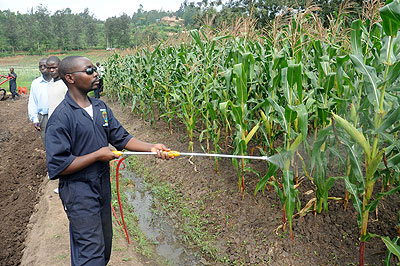Preparatory work for implementing the East African Community food security action plan is ongoing. Shem Bagaine, the chairperson of the EAC Council of Ministers, said the plan entails development of a food security and nutrition policy; a regional food balance sheet framework; an agricultural development fund; and an early warning system for monitoring food shortage.


Preparatory work for implementing the East African Community food security action plan is ongoing.Shem Bagaine, the chairperson of the EAC Council of Ministers, said the plan entails development of a food security and nutrition policy; a regional food balance sheet framework; an agricultural development fund; and an early warning system for monitoring food shortage.He was briefing members of the East African Legislative Assembly (EALA) on the progress made in the implementation of EAC food security action plan with regard to irrigation and financial mobilisation for the food security sector.The EAC has about nine months of rains, ample land for farming and has a Food Security Action Plan which earlier received backing from EALA. Bagaine said: "Development of integrated water management project proposals, including appropriate irrigation projects which are site specific, is being undertaken by the partner states and the Secretariat.” He added that proposals have been submitted and discussions are ongoing with various development partners to support the planned activities.FundingThe EAC Secretariat will hold a donor’s conference during the next financial year to mobilise additional resources for implementing the plan, according to Bagaine. "However, for the EAC to overcome its current food security problems partner states will have to make substantial investment in the agriculture sector development at national level, as regional interventions can only succeed if national strategies are successfully implemented,” he said. Bagaine said partner states should commit a substantial proportion of the financial requirements for implementing the plan in their national budgets and further mobilise additional funds from development partners and other sources. Fertilisers critical MP Christophe Bazivamo [Rwanda] told the House that as far as food security is concerned, agricultural inputs, especially seeds and fertilisers, are crucial.Bagaine said: "The studies are at an advanced stage. Projects have already started. There is a project in Kenya to produce fertilisers – and also, there is a project coming up in Tororo [Uganda], using the naturally available phosphates and, these two should be able to produce enough fertilisers for increased application in our farming.”The application of fertilisers in the region, according to him, has been as low as 2 kilogrammes per hectare. "We’ve been spending lots of money importing fertilisers. Hopefully, in the nearest future, we will be self sufficient in terms of fertiliser production, which should reduce costs to the farmers and give them better profitability in their enterprises.” A new report by USAID’s Famine Early Warning System, says an estimated 12.9 million people in Sudan, South Sudan, Somalia, Ethiopia, Kenya, Djibouti, Uganda, Burundi, Tanzania, and Rwanda "face stressed to crisis levels” of food insecurity, a substantial reduction from the 14.9 million that needed assistance at the end of last year.


